高考英语习惯语法用法汇总
广东高中英语语法知识点总结及高考考点分析

广东高中英语语法知识点总结及高考考点分析一、动词时态和语态1.一般现在时:表示经常性或习惯性的动作、存在、状态以及客观真理。
2.一般过去时:表示过去发生的动作或存在的状态。
3.一般将来时:表示将要发生的动作或存在的状态。
4.现在进行时:表示现在正在进行的动作。
5.现在完成时:表示过去开始,持续到现在的动作。
6.过去进行时:表示过去其中一时间正在进行的动作。
7.过去完成时:表示过去其中一时间之前完成的动作。
8.将来进行时:表示将来其中一时间正在进行的动作。
9.将来完成时:表示将来其中一时间之前完成的动作。
10.一般条件句:表示与现在或将来事实相反的虚拟情况。
11.过去条件句:表示与过去事实相反的虚拟情况。
12.时态的混合使用:表示过去其中一时间之前发生和完成的动作。
二、非谓语动词1. 不定式(to do):表示目的、用途、愿望、不愿意、建议等。
2. 动名词(doing):作主语、宾语、表语、定语和状语。
3. 分词(V-ing / V-ed):作定语、表语、补语、状语。
三、情态动词1. can / could:表示能力、请求、许可、可能性。
2. may / might:表示可能性、许可。
3. must:表示推测、肯定、必要性、命令。
4. shall / should:表示征求意见、建议、义务。
5. will / would:表示意愿、习惯、打算、请求、坚持。
6. ought to:表示应该。
四、被动语态1.一般现在时的被动语态。
2.一般过去时的被动语态。
3.一般将来时的被动语态。
4.现在进行时的被动语态。
5.现在完成时的被动语态。
6.过去进行时的被动语态。
7.过去完成时的被动语态。
五、名词1.可数名词和不可数名词。
2.名词的单复数形式。
3.名词所有格的形式。
4.物质名词。
5.数词的用法。
六、冠词1. 定冠词(the)的用法。
2. 不定冠词(a / an)的用法。
3.零冠词的用法。
七、代词1.主格代词、宾格代词和所有格形式。
名校版高考高中英语语法详解 Something惯用法
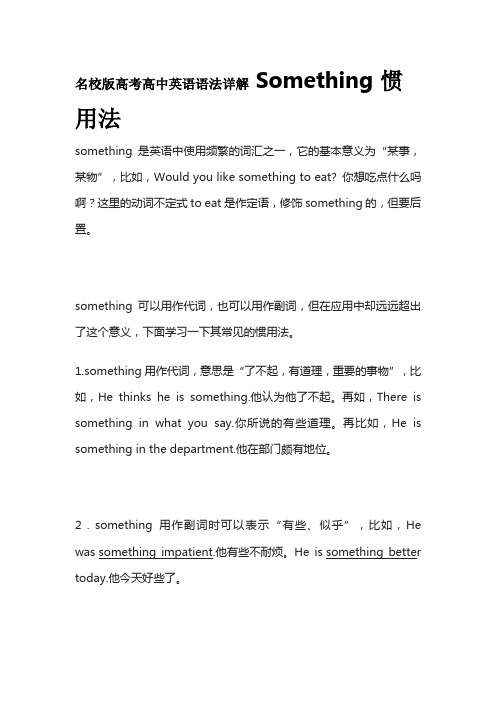
名校版高考高中英语语法详解Something惯用法something是英语中使用频繁的词汇之一,它的基本意义为“某事,某物”,比如,Would you like something to eat? 你想吃点什么吗啊?这里的动词不定式to eat是作定语,修饰something的,但要后置。
something可以用作代词,也可以用作副词,但在应用中却远远超出了这个意义,下面学习一下其常见的惯用法。
1.something用作代词,意思是“了不起,有道理,重要的事物”,比如,He thinks he is something.他认为他了不起。
再如,There is something in what you say.你所说的有些道理。
再比如,He is something in the department.他在部门颇有地位。
2.something用作副词时可以表示“有些、似乎”,比如,He was something impatient.他有些不耐烦。
He is something better today.他今天好些了。
3.搭配or something的意思是“……之类的人,东西或情况”,表示对所陈述的对象不十分肯定,比如,He is the wool merchant or something.他是个羊毛商之类的人。
再比如,He is a teacher or something.他大概是个当老师的。
再比如,I hear he has broken an arm or something.我听说他断了一只手臂什么的。
4.something of表示“在某种意义或程度上……,有几分,有些像”等等,比如,The city proved to be something of a disappointment.结果这座城市证明有点儿令人失望。
再比如,The soldiers found himself something of a hero when he returned to his village.那个士兵回到村里时,发现人们有几分把它当做英雄看待。
高考英语语法总结

高考英语语法总结高考英语语法总结总结就是对一个时期的学习、工作或其完成情况进行一次全面系统的回顾和分析的书面材料,通过它可以正确认识以往学习和工作中的优缺点,不如立即行动起来写一份总结吧。
那么总结应该包括什么内容呢?下面是店铺为大家收集的高考英语语法总结,仅供参考,欢迎大家阅读。
高考英语语法总结1不定冠词a,an与one同源,表示微弱的一的概念,但并不强调数目,用来表示不确定的人或事物。
A用在辅音前,而不是辅音字母前;an用在元音前,而不是元音字母前。
a university in Asia1.表示同类中的任何一个A cat has nine lives.2.表示泛指的某人、某物I know a John Lennon,but not the famous one.3.表示数量的He has a daughter.4. 表示单位数量的每一I earn 10 dollars an hour.5.表示相同的The two birds are of a color.6. 用于集体名词前He grows up in a large family.7. 在某种情况下可用于抽象名词和物质名词前China has a long history.高考英语语法总结21.表示特定的人或物2.表示地球、宇宙中独一无二的事物主要指各种天体及世界上比较有影响的物体。
The sun,the moon,the earth3.表示地点、方向、时间、方式等 at the corner 在拐角处1) 在表示季节的名词前常不用冠词。
In spring 在春天2) 具体某年的某个季节,需用冠词。
In the summer of the year20083)用于序数词或形容词的最高级前 the first the second4)用于形容词前使其名词化 the rich the poor5)用于复数姓氏前,表示―夫妇‖或全家 The Smiths6)用于乐器名词前 Play the piano7)用于by+the+计量单位名词 By the pound高考英语语法总结31. 用于复数名词前复数名词泛指某类人或物时,其前通常用零冠词。
高中英语习惯用法汇总

由顾燕卿上传高中英语习习用法汇总1. It ’ s the first time that.()It was for the first time that ( for the first time)It ’ s (high) time that..(should do)2.It ’ s the same with sb. / Soitis with sb.3. be about to do / be doing when / . .4 A is twice / three times as + +as B Ais twice / three times the n. of B.A is twice / three times ++than B5.It ’ s a waste of time / money doing / to doIt ’ s no use / good doingIt ’ s possible / probable / (un) likely that .It makes great / no sense to do/6.There ’ s no use / good doing .There ’ s no sense / point (in) doingThere is no need for sth. / to do .There is (no) possibility that7.The+.., the+.., .8.It seems / appears ( to sb. ) that sb ....= Sb. seems / appears to be / to do / to be doing / to have doneIt seems / looks as if/ . ..9.It (so) happened that sb.....= Sb. happened to be / to do / to be doing / to have done..10.It is said / thought / believed / hoped / supposed.that sb=Sb. is said to be / to do / to be doing / to have done.(hope hope sb. to do)12.such.that . ..such..as .. (as )13. Do you mind if I do sth.?/ Would you mind if I did sth.?14. The chance is that../ (The )Chances are that. .15.Check / Make sure / See to it / See that..()/..16.depend on it that..see to it that/. .except / but / inthat it17It is / was +///+thatHow / When / Where / Why is / was it that..?who18.How is it that..“.? ”“”How come+How does / did sth. come about? ( How did it come about that).?:How come you are late again?19.There seems / appears / happens to be / must be / can’ t be / is (are, was, weresaid to be / is (are, was, were) thought to be .“ . / / / / / ..”of there beingwant / wish / expect there to be / / ..adj. / adv. enough for there to be . . there being / there to be there beIt is said / thought thatthere is / are=There is / was / are / were said (thought) to be . I have never dream of there being such a good chance for me.It won ’ t be cold enough for there to be a frost tonight.20. ++ Who do you think he ’ ll have attend the meeting? 21. But for + n. / pron., sb. / sth. would (not) have done ...,( )=If it had not been for .., ./If there had not been., .. / . 22. It won( ’ t) be longforebe +It was (not) long before+ /.. 23. Those who.( ).)Anyone who= Whoever..( 24 . ...when .(might / should do might / should have done) ” ”, “ ( ) ”, , , :Why are you here when you should be in school?? He stopped trying when he might have succeeded . . 25. There is ./ Sb. have no doubt that ( ,that )There is / Sb. have some doubt whether ..(if) Sb. doubt if / whether . 26Sb. don ’ t doubt that . immediately / directly / instantly / the moment + on / upon + n. / doing .( )No sooner had sb. done thanHardly had sb. done when ..( )“ . ”27. every time / each time / the last time / the first time / next time +anywhere / everywhere + whereverYou can go anywhere you like. Next time you come, please bring your son along. 28.If only / I wish + ( ) , “ . ” “ ! ” 29 .Considering + n. pron. that / Seeing that . / . Given + n. / pron , “ ” “ ” “ ”, ” ”Seeing (that) he refused to help us, there is no reason why we should help him now.Given good health, I hope to finish the work this year. Given their inexperience / that they are inexperienced, they ’ ve done a good 30.There was a time when . . 31.other than no, not, none , , : It was none other than Mr. Smith. Smith . 32. Not until .did / do/ does / will sb. do It was / is not until that sb 33.It ’ s (un) like sb. to do / to have done / 34.It remains to be seen Wh-- words .. . .( that, if )35.It only remains for sb. to do .We’ ve got everything ready. It only remains for you to come to dinner.36.One moment., and now方才一会儿还在做而此刻却..37.Not all / both / everyone表示部分否认38. Such is / are这(些.. )就是.(谓语动词单复数由后边名词决定)39.I ’ d rather (not) do / have done我情愿..I’ d rather从+句(从句顶用过去时或过去达成时)40. It ’importants / necessary / strange / surprising .+that (用陈说语气或 should do)41. I like / hate / appreciate it that / when 等从句(it 表示后边从句的这类状况 ) Iappreciate it if you will give me a hand.42.By the time +从句(一般此刻时 /过去时),主句(未来达成时 /过去达成时)43., as is often the case with sb. / as is usual with sb.(as指引非限制性定语从句)44 in case / lest / for fear that从句顶用陈说语.(气或should do)45.While 置于句首可表示As long as 或 AlthoughWhile there is life there is hope.While I admit his good points, I can see his bad ones.46.can not ( never)too +adj. (adv. ) / adj. (adv.) + enough越越好”“特别“”too + adj. ( anxious / eager / willing / ready / glad 等 )+to do .表示一定意思 Ican ’ t thank you enough我非.常感谢你 .He was too glad to see his father.=He was very glad to see his father.47.not / neve 等表示否认的词与比较级连用表示最高等,如:-----Do you agree with his suggestion? ------- I can ’ t agree more.48.What if 假如.. .怎么办?What if he doesn t come’ tomorrow?49.more..than与其 .不如 .. He is morenervous than frightened.50. It is / has been + 一段时间 +since 从句 (从句中如为持续性动词,则实质表示的意思相反 )It is two years since he drank.他不饮酒已两年.了【各个击破】1. Mr. Smith didn’ t understand ______ made his son so upsetmorningthis.A. what was itB. why it was thisC. how that wasD. what it was that2.-----Did you have a good sleep last night?----Yes, never sleep _______.A. badlyB. betterC. worseD. best3. We are only _____ glad to do anything we can _______ her.A. too; to helpB. very; help C too; help D. very; helping4.-----How come you are late for class again?-------_____________.A. Because I missed the busB. By bus and then on footC.Please excuse me D. It ’ s quite wrong 5. _______morethan 3,000 languages in the world. A. There are thoughtto be B. There is thought to be C. They are thought to beD. It is thought to be6.-----George is a wise person.-----But in my opinion, he is ______ than wise.7.-----So can I ask you a few fairly straightforward questions about yourself?-----No problem. I like ________ when people are open and direct.A. thatB. thisC. itD. them8. ----______I move the picture over here?----I suppose it’ ll lookerbett.A. How ifB. What aboutC. How aboutD. What if9. China has produced ______ this year as it did in 2002.A. as twice much steelB. twice steel as muchC. twice as much steelD. as much steel twice10.-----_______was it ______ you discovered the secret of his?------Totally by chance.C. What; whenD. How; thatA. How; whenB. What; that11.-----Who on earth could it be?------It was _______ other than Clint Eastwood.A. noneB. nothingC. notD. nobody12._____his age, he did it quite well, so don’ t ______ him any more.A Given; blame B. Considered; say C. To regard; scold D. Considering; speak13.No sooner _____ themselves in their seats in the theatre ______ the curtain went up.A. they have settled; beforeB. had they settled; thanC.have they settled; when D. they had settled; than14.-----Did you meet with the famous space hero, Yang Liwei?------______I had come here earlier!A. If onlyB. If notC. But forD. For fear15.The students expected __________ more reviewing classes before the final exams.A. it would beB. there beingC. it to beD. there to be16.Students shouldn’ t be given so difficult a problem _____ they can not work out.A. thatB. whichC. whileD. as17. It was twelve o’ clockmidnightat _______ they arrived at a lonely village.A. thatB. beforeC. sinceD. when18.----- The exam wasn ’ t difficult, was it?------ No, but I don’ t think ______could pass it.A. somebodyB. anybodyC. everybodyD. nobody19.-----I always take care when doing papers on the computer.-----You meant it! One can not be_______careful working on it.A. tooB. veryC. soD. quite20.-----Is Miss White working these days?------No. It is two months since she worked here.------Oh,_____________?A. where is she working nowB. would you please show me the wayC. which is her officeD. is she ill。
高考英语语法归纳大全
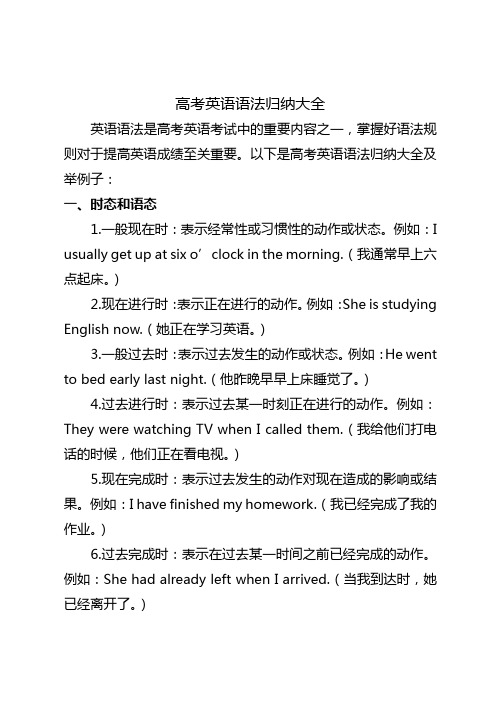
高考英语语法归纳大全英语语法是高考英语考试中的重要内容之一,掌握好语法规则对于提高英语成绩至关重要。
以下是高考英语语法归纳大全及举例子:一、时态和语态1.一般现在时:表示经常性或习惯性的动作或状态。
例如:I usually get up at six o’clock in the morning.(我通常早上六点起床。
)2.现在进行时:表示正在进行的动作。
例如:She is studying English now.(她正在学习英语。
)3.一般过去时:表示过去发生的动作或状态。
例如:He went to bed early last night.(他昨晚早早上床睡觉了。
)4.过去进行时:表示过去某一时刻正在进行的动作。
例如:They were watching TV when I called them.(我给他们打电话的时候,他们正在看电视。
)5.现在完成时:表示过去发生的动作对现在造成的影响或结果。
例如:I have finished my homework.(我已经完成了我的作业。
)6.过去完成时:表示在过去某一时间之前已经完成的动作。
例如:She had already left when I arrived.(当我到达时,她已经离开了。
)7.将来时:表示将要发生的动作或状态。
例如:We will go to the park tomorrow.(我们明天会去公园。
)8.被动语态:表示动作的承受者是主语。
例如:The book was written by him.(这本书是他写的。
)二、从句1.名词性从句:在句子中作主语、宾语、表语等成分的从句。
例如:What he said is true.(他说的是真的。
)2.定语从句:修饰先行词的从句。
例如:The man who is standing there is my father.(站在那里的人是我的父亲。
)3.状语从句:在句子中作时间、地点、原因、条件等状语的从句。
高考英语语法大全固定搭配用法总结

高考英语语法大全固定搭配用法总结考试英语语法大全:常规搭配用法总结高考专业术语大全:固定搭配用法总结【重点精华】1.It’sthefirsttimethat.(从句中用现在完成时)Itwasforthefirsttimethat(强调句,对状语forthefirsttime进行强调)It’s(high)timethat..(从句中用过去时或shoulddo)2.It’sthesamewithsb./Soitiswithsb.表示某人也如此(用于前句中每种既有肯定又有否定或两个不同类的谓语动词)3.beabouttodo/bedoingwhen.正要做/正在做就在那时.4.Aistwice/threetimesas+原级+asBA是B的两倍/三倍Aistwice/threetimesthen.ofB.A的是B的两倍/三倍Aistwice/threetimes+比较级+thanBA比B多两倍/三倍5.It’sawasteoftime/m oneydoing/todo做浪费时间/金钱It’snouse/gooddoing做是没有用的It’spossible/probable/(un)likelythat.很可能Itmakesgreat/nosensetodo做某事很有/没意义6.There’snouse/gooddoing.做没有用There’snosense/point(in)doing做没有意义Thereisnoneedforsth./todo.没有过必要做Thereis(no)possibilitythat(同位语从句)很可能/没可能7.The+比较级..,the+比较级越..,越.注意:前半句为从句,用一般现在时代替将来时;8.Itseems/appears(tosb.)thatsb.在某人看来某人=Sb.seems/appearstobe/todo/tobedoing/tohavedone..Itseems/look sasif.好象/似乎..9.It(so)happenedthatsb...某人碰巧..=Sb.happenedtobe/todo/tobedoing/tohavedone..10.Itissaid/thought/believed/hoped/supposed.thatsb=Sb.issaidt obe/todo/tobedoing/tohavedone.(注意:这种句型里如带动词hope 则不能变成简单句,因为无hopesb.todo结构)[要学习网一直在为调动你的学习积极性而努力]12..such.that.如此.以致于(引导结果状语从句).such..as像..的这种(as为关系代词,引导定语从句,在从句里充当主、宾、表)13.DoyoumindifIdosth.?/WouldyoumindifIdidsth.?你介意我做吗?14.Thechanceisthat../(The)Chancesarethat.很可能.15.Check/Makesure/Seetoit/Seethat..(从句中常用一般现在之时)确信/务必..16.dependonitthat..取决于seetoitthat.负责/设法做到.注意:除了except/but/in等介词可以直接接that从句,其它介词后必须用it做形式宾语;17.Itis/was+介词短语/从句/名词/代词等+thatHow/When/Where/Whyis/wasitthat..?注意:此句型为强调句,当被强调的为指出人的词时,还可用who 连接;强调主语时,定冠词从句后的谓语动词应与前面的主语保持一致;注意与定语从句的区别)18.Howisitthat..(这几个句式都表示“怎么会.?”“怎么发生的?”)He+从句?Howdoes/eabout?(Howdiditcomeaboutthat.?)如:Heyouarelateagain?19.Thereseems/appears/happenstobe/mustbe/can’tbe/is(are,was, were)saidtobe/is(are,was,were)thoughttobe.表示“.似乎有/碰巧有/一定有/不可能有/据说有/认为有..”介词(如of)therebeingwant/wish/expecttheretobe要/希望/期待有..adj./adv.enoughfortheretobe.足够.会有.注意:therebeing/theretobe为therebe的非谓语形式;Itissaid/thoughtthatthereis/are=Thereis/was/are/weresaid(t hought)tobe.如:Eg:Ihaveneverdreamoftherebeingsuchagoodchanceforme.Itwon’tbe coldenoughfortheretobeafrosttonight.20.疑问词+插入语+陈述语序?Eg:Whodoyouthinkhe’llhaveattendthemeeting?21.Butfor+n./pron.,sb./sth.would(not)havedone..要不是.,某人早就(表示虚拟语气)=Ifithadnotbeenfor..,./Iftherehadnotbeen..22.Itwon(’t)belongbefore+从句(从句中用一般现如今时)不久/很久就要.Itwas(not)longbefore+从句(从句中用一般过去之时)不久/很久才..23.Thosewho.(从句及主句中会复数谓语动词用复数形式).Anyonewho=Whoever..(从句及主句中谓语介词用单数单数形式)24.主句(一般现在时或最近时)...when从句.(might/shoulddo或might/shouldhavedone)表示”对比”,意思为“本该(可)而却”,主句中为陈述语气,从句里为虚拟语气Eg:Whyareyouherewhenyoushouldbeinschool?你本该上学的怎么在这儿?Hestoppedtryingwhenhemighthavesucceeded.本该已成功了他却停止努力了.25.Thereis./Sb.havenodoubtthat(同位语从句,that不可省略)毫无疑问Thereis/Sb.havesomedoubtwhether..(同位语从句不可用if)不确定是否Sb.doubtif/whether.某人怀疑是否Sb.don’tdoubtthat某人不怀疑26.immediately/directly/instantly/themoment+从句on/upon+n./doingNosoonerhadsb.donethan.(过去时)Hardlyhadsb.donewhen..(过去时)注意:这几个结构都表示“一.就”;27.everytime/eachtime/thelasttime/thefirsttime/nexttime+从句(名词性短语引导一个时间状语句)anywhere/everywhere+从句(相当于wherever引导的地点状语从句)Eg:Youcangoanywhereyoulike.Nexttimeye,pleasebringyoursonalong.28.Ifonly/Iwish+从句(用过去类时态)表示虚拟语气,“要是.就好了”“但愿就好了!”29.Considering+n.或pron.或that从句/Seeingthat.考虑到/鉴于.Given+n./pron作状语,表示“在有的情况下”“如果有”“假定”,有时也表示”考虑到”Eg:Seeing(that)herefusedtohelpus,thereisnoreasonwhyweshouldhe lphiGivengoodhealth,Ihopetofinishtheworkthisyear.Giventheirinexpe rience/thattheyareinexperienced,they’vedoneagoodjob.30.There wasatimewhen.曾经有那么一度.31.otherthan与no,not,none等否定词连用,表示肯定意思,如:Eg:ItwasnoneotherthanMr.Smith.这正是Smith先生.32.Notuntil.did/do/does/willsb.doItwas/isnotuntilthatsb33.It’s(un)likesb.todo/tohavedone做某事很像某人/做某事可不像某人34.ItremainstobeseenWh--words..是否.还有待于看.(不用that,if作连接词)35.Itonlyremainsforsb.todo剩余的只是要某人做某事.Eg:We’vegoteverythingready.Itonlyremainsforyoutocometodinner .36.Onemoment.,andnow刚才一会儿还在做而现在却..37.Notall/both/everyone表示部分否定38.Suchis/are..这(些)就是.(谓语代词单复数由后面名词决定)39.I’drather(not)do/havedone我宁愿..I’drather+从句(从句中用过去时或过去完成时)40.It’simportant/necessary/strange/surprising.+that(用陈述语气或shoulddo)41.Ilike/hate/appreciateitthat/when等从句(it表示后面从句的这种情况)Eg:Iappreciateitifyouwillgivemeahand.42.Bythetime+从句(一般现在时/过去时),主句(将来完成时/过去完成时)43.,asisoftenthecasewithsb./asisusualwithsb.(as引导非限制性定语从句)44incase/lest/forfearthat.(从句中用陈述言语或shoulddo)45.While置于句首可表示Aslongas或AlthoughEg:Whilethereislifethereishope.[要学习网一直在为调动你的学习积极性而努力]WhileIadmithisgoodpoints,Icanseehisbadones.46.cannot(never)too+adj.(adv.)/adj.(adv.)+enough“越越好”“非常”too+adj.(anxious/eager/willing/ready/glad等)+todo.表示肯定意思Eg:Ican’tthankyouenough.我非常感激你.Hewastoogladtoseehisfather.=Hewasverygladtoseehisfather.47.no t/neve等表示否定的词与比较级连用表示最高级,如:Eg:-----Doyouagreewithhissuggestion?-------Ican’tagreemore.48.Whatif..要是.怎么办?Eg:Whatifhedoesn’tcometomorrow?49.more..than与其.不如..Eg:Heismorenervousthanfrightened.50.Itis/hasbeen+一段时间+since从句(从句中如为延续性动词,则实际透露的意思相反)Eg:Itistwoyearssincehedrank.他不能喝酒已两年了.高考英语语法大全:固定搭配用法阐述(一)1.It’sthefirsttimethat(从句中用现在完成时)Itwasforthefirsttimethat(强调句,对状语forthefirsttime进行强调)It’s(high)timethat(从句中用过去时或shoulddo)2.It’sthesamewithsb/Soitiswithsb表示某人也如此(前句中既有肯定又有否定或两个不同类的谓语动词)3.beabouttodo/bedoingwhen正要做/正在做就在那时4.Aistwice/threetimesas+原级+asBA是B的两倍/三倍Aistwice/threetimesthen.ofB.A的是B的两倍/三倍Aistwice/threetimes+比较级+thanBA比B多两倍/三倍5.It’sawasteoftime/moneydoing/todosth做浪费时间/金钱It’snouse/gooddoing做是没有用的It’spossible/probable/(un)likelythat很可能Itmakesgreat/nosensetodo做某事很有/没意义6.There’snouse/gooddoing做没有用There’snosense/point(in)doing做没有意义Thereisnoneedforsth/todo没有过必要做Thereis(no)possibilitythat(同位语从句)很可能/没可能7.The+比较级,the+比较级越,越注意:前半句为从句,用一般现在时代替从今以后时;8.Itseems/appears(tosb)thatsb在某人看来某人=Sb.seems/appearstobe/todo/tobedoing/tohavedoneItseems/looksa sif好象/似乎9.It(so)happenedthatsb某人碰巧=Sb.happenedtobe/todo/tobedoing/tohavedone10.Itissaid/thought /believed/hoped/supposedthatsb=Sb.issaidtobe/todo/tobedoing/t ohavedone(注意:这种片语里如带动词hope则不能变成简单句,因为无hopesb.todo结构)12.suchthat如此以致于(引导结果状语从句)suchas像的这种(as为关系代词,引导定语从句,在从句里充当主、宾、表)13.DoyoumindifIdosth.?/WouldyoumindifIdidsth.?你介意我做吗?14.Thechanceisthat/(The)Chancesarethat很可能15.Check/Makesure/Seetoit/Seethat(从句中所常用一般现在时)确信/务必16.dependonitthat取决于seetoitthat负责/设法做到注意:除了except/but/in等介词可以直接留that从句,其它介词后必须用it做形式宾语;17.Itis/was+介词短语/从句/名词/代词等+thatHow/When/Where/Whyis/wasitthat?注意:此句型为强调句,当被强调的为表示人的词时,还可用who 连接;强调主语时,上面从句后的谓语动词应与前面的主语保持一致;注意与定语从句的区别)18.Howisitthat(这几个句型都表示“怎么会?”“怎么发生的?”)He+从句?Howdoes/eabout?(Howdiditcomeaboutthat?)如:Heyouarelateagain?19.Thereseems/appears/happenstobe/mustbe/can’tbe/is(are,was, were)saidtobe/is(are,was,were)thoughttobe表示“.似乎有/碰巧有/一定有/不可能有/据说有/认为有”介词(如of)therebeingwant/wish/expecttheretobe要/希望/期待有adj./adv.enoughfortheretobe足够会有注意:therebeing/theretobe为therebe的非谓语形式;Itissaid/thoughtthatthereis/are=Thereis/was/are/weresaid(t hought)tobe如:Eg:They’veneverdreamoftherebeingsuchagoodchanceforme.Itwon’tbecoldenoughfortheretobeafrosttonight.20.疑问词+插入语+陈述语序?Eg:Whodoyouthinkhe’llhaveattendthemeeting?高考英语语法大全:固定搭配用法总结(二)21.Butfor+n/pron,sb./sth.would(not)havedone不是,某人早就(表示虚拟语气)=Ifithadnotbeenfor/Iftherehadnotbeen22.Itwon(’t)belongbefore+从句(从句中用一般现在时)不久/很久就要Itwas(not)longbefore+从句(从句中用一般过去时)不久/很久才23.Thosewho(从句及主句中谓语动词用复数形式).Anyonewho=Whoever(从句谓语及主句中谓语动词用单数方式)24主句(一般现在时或过往时)when从句(might/shoulddo或might/shouldhavedone)表示”对比”,意思为“本该(可)而却”,主句中为陈述语气,从句里为虚拟语气Eg:Whyareyouherewhenyoushouldbeinschool?你峭腹上学的怎么在这儿?Hestoppedtryingwhenhemighthavesucceeded.本该已成功了他却停止努力了.25.Thereis/Sbhavenodoubtthat(同位语从句,that不可省略)毫无疑问Thereis/Sbhavesomedoubtwhether(同位语从句不可用if)不确定是否Sb.doubtif/whether某人怀疑是否Sb.don’tdoubtthat某人不怀疑26.immediately/directly/instantly/themoment+从句on/upon+n./doingNosoonerhadsb.donethan(过去时)Hardlyhadsb.donewhen(过去时)注意:这几个结构都表示“一就”;27.everytime/eachtime/thelasttime/thefirsttime/nexttime+从句(名词性短语引导一个时间棒状语句)anywhere/everywhere+从句(相当于wherever引导的地点状语从句)Eg:Youcangoanywhereyoulike.Nexttimeye,pleasebringyoursonalong.28.Ifonly/Iwish+从句(用过去类时态)表示虚拟语气,“要是就好了”“但愿就好了!”29.considering+n.或pron.或that从句/seeingthat考虑到/鉴于Given+n./pron作状语,表示“在有的情况下”“如果有”“假定”,有时也表示”考虑到”Eg:Seeing(that)herefusedtohelpus,thereisnoreasonwhyweshouldhe lphiGivengoodhealth,Ihopetofinishtheworkthisyear.Giventheirinexperience/thattheyareinexperienced,they’vedonea goodjob.30.Therewasatimewhen曾经有那么一度31.otherthan与no,not,none等否定词连用,表示肯定意思,如:Eg:ItwasnoneotherthanMr.Smith.这正是Smith先生.32.Notuntildid/do/does/willsb.doItwas/isnotuntilthatsb33.It’s(un)likesb.todo/tohavedone做某事很像某人/做某事可不像某人34.ItremainstobeseenWh-words是否还有待于看.(不用that,if作连接词)35.Itonlyremainsforsb.todo剩下的只是要某人做某事.Eg:We’vegoteverythingready.Itonlyremainsforyoutocometodin ner.高考英语语法大全:下挂搭配用法总结(三)36.Onemoment,andnow刚才一会儿还在做而现在却37.Notall/both/everyone表示部分否定38.Suchis/are这(些)就是(谓语动词单复数由词语后面名词决定)39.I’drather(not)do/h avedone我宁愿..I’drather+从句(从句譬如过去定冠词时或过去完成时)40.It’simportant/necessary/strange/surprisingthat(用陈述语气或shoulddo)41.Ilike/hate/appreciateitthat/when等从句(it表示后面从句的这种情况)Eg:Iappreciateitifyouwillgivemeahand.42.bythetime+从句(一般现在时/过去时),主句(将来完成时/过去完成时)43.asisoftenthecasewithsb./asisusualwithsb.(as引导而非限制性定语从句)44incase/lest/forfearthat(从句中用陈述语气或shoulddo)45.While置于句首可表示Aslongas或AlthoughEg:Whilethereislifethereishope.WhileIadmithisgoodpoints,Icanseehisbadones.46.cannot(never)too+adj(a dv)/adj(adv)+enough“越越好”“非常”too+adj(anxious/eager/willing/ready/glad等)+todo表示肯定意思Eg:Ican’tthankyouenough.我非常感激你.Hewastoogladtoseehisfather.=Hewasverygladtoseehisfather.47.no t/never等表示否定的词与比较级连用表示最高级,如:Eg:--Doyouagreewithhissuggestion?--Ican’tagre emore.48.Whatif要是怎么办?Eg:Whatifhedoesn’tcometomorrow?49.morethan与其不如Eg:Heismorenervousthanfrightened.50.Itis/hasbeen+一段时间+since从句(从句中如为延续性动词,则实际表示的意思相反)Eg:Itistwoyearssincehedrank.他不喝酒已两年了.。
高中英语语法:高考16种英语时态(用法+例句)

1一般现在时(do/does;is/am/are)①表示现在的情况、状态或特征。
例:He is a student.他是一个学生。
②表示经常性、习惯性动作。
例:He always helps others.他总是帮助别人。
③客观事实和普遍真理。
例:The earth moves the sun.地球绕着太阳转。
④表示一个按规定、计划或安排要发生的动作。
仅限于某些表示“来、去、动、停、开始、结束、继续”等的动词,可以与表示未来时间的状语搭配使用。
常见的用法是:飞机、火车、轮船、汽车等定期定点运行的交通方式。
例:The next train leaves at3o'clock this afternoon.下一趟火车今天下午3点开车。
⑤在时间、条件和让步状语从句中经常用一般现在(有时也用现在完成时)表示将的来事情。
(即:主将从现原则)例:I will call you as soon as I arrive at the airport.我一到机场就会给你打电话。
When you have finished the report,I will have waited for about3hours.等你完成这份报告的时候,我就已经等了将近3个小时了。
2现在进行时(am/is/are doing)①表示此时此刻正在发生的事情。
例:He is listning to the music now.他现在正在听音乐。
②表示目前一段时间内一直在做的事情,但不一定此时此刻正在做。
例:I am studying computer this term.这个学期我一直在学习计算机。
③现在进行时可以表示将来的含义。
a.瞬时动词的进行一定表将来。
例:I am leaving.我要离开了。
b.持续动词的进行只有有将来的时间状语或有将来语境中才表将来。
例:I am travelling next month.下个月我要去旅行。
高考英语语法整理(全)
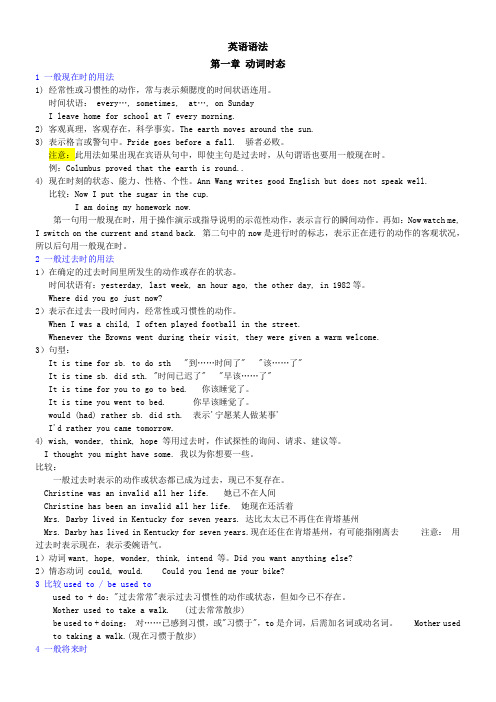
英语语法第一章动词时态1 一般现在时的用法1) 经常性或习惯性的动作,常与表示频腮度的时间状语连用。
时间状语: every…, sometimes, at…, on SundayI leave home for school at 7 every morning.2) 客观真理,客观存在,科学事实。
The earth moves around the sun.3) 表示格言或警句中。
Pride goes before a fall. 骄者必败。
注意:此用法如果出现在宾语从句中,即使主句是过去时,从句谓语也要用一般现在时。
例:Columbus proved that the earth is round..4) 现在时刻的状态、能力、性格、个性。
Ann Wang writes good English but does not speak well.比较:Now I put the sugar in the cup.I am doing my homework now.第一句用一般现在时,用于操作演示或指导说明的示范性动作,表示言行的瞬间动作。
再如:Now watch me, I switch on the current and stand back. 第二句中的now是进行时的标志,表示正在进行的动作的客观状况,所以后句用一般现在时。
2 一般过去时的用法1)在确定的过去时间里所发生的动作或存在的状态。
时间状语有:yesterday, last week, an hour ago, the other day, in 1982等。
Where did you go just now?2)表示在过去一段时间内,经常性或习惯性的动作。
When I was a child, I often played football in the street.Whenever the Browns went during their visit, they were given a warm welcome.3)句型:It is time for sb. to do sth "到……时间了" "该……了"It is time sb. did sth. "时间已迟了" "早该……了"It is time for you to go to bed. 你该睡觉了。
高考英语语法知识点整理总结归纳

高考英语语法知识点整理总结归纳高考英语语法知识点整理总结归纳英语改错题目当中,连词错误,经常出现的是转折与承接的错误,也就是but与and应用错误,此外现在分词和过去分词的错误也是一直都出现的。
下面是小编为大家整理的高考英语语法知识点整理总结,希望对您有所帮助!高考英语语法知识点整理总结一、不定式做主语:1、不定式做主语一般表示具体的某次动作。
===动名词doing 表示习惯的,经常的动作。
e.g: To finish the building in a month is difficult.To do such things is foolish.To see is to believe. (对等)注: 1).不定式作主语时,谓语用单数2).当主语较长,谓语较短时,常用it做形式主语,而将不定式放到谓语的后面。
it做形式主语,不定式放在谓语动词之后常用于下列结构中:(1)It is/was +adj.+of sb. to do…(2) It is +adj.+for sb.+to do…It is easy / difficult / hard / foolish / unwise / right / wrong / unnecessary(3) it is +a +名词+ to do...It is a pity / a pleasure / a pleasant thing / one’s duty / an honor / a shame / a crime / no easy job… to doIt takes (sb.) some time / courage / patience …to do…It requires courage / patience / hard work… to do…注意: probable和possible均可作表语,但possible可以用不定式作真实主语,而probable不能用不定式作真实主语。
高考英语高频语法
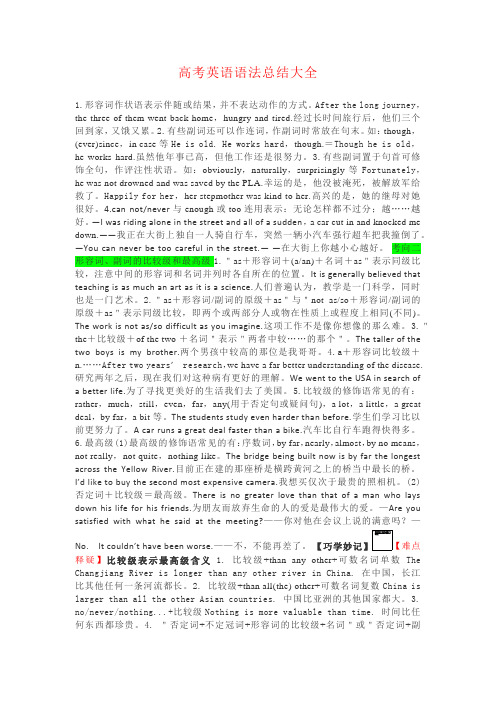
高考英语语法总结大全1.形容词作状语表示伴随或结果,并不表达动作的方式。
After the long journey,the three of them went back home,hungry and tired.经过长时间旅行后,他们三个回到家,又饿又累。
2.有些副词还可以作连词,作副词时常放在句末。
如:though,(ever)since,in case等He is old. He works hard,though.=Though he is old,he works hard.虽然他年事已高,但他工作还是很努力。
3.有些副词置于句首可修饰全句,作评注性状语。
如:obviously,naturally,surprisingly等Fortunately,he was not drowned and was saved by the PLA.幸运的是,他没被淹死,被解放军给救了。
Happily for her,her stepmother was kind to her.高兴的是,她的继母对她很好。
4.can not/never 与enough 或too连用表示:无论怎样都不过分;越……越好。
—I was riding alone in the street and all of a sudden,a car cut in and knocked me down.——我正在大街上独自一人骑自行车,突然一辆小汽车强行超车把我撞倒了。
—You can never be too careful in the street.——在大街上你越小心越好。
考向二形容词、副词的比较级和最高级1."as+形容词+(a/an)+名词+as"表示同级比较,注意中间的形容词和名词并列时各自所在的位置。
It is generally believed that teaching is as much an art as it is a science.人们普遍认为,教学是一门科学,同时也是一门艺术。
英语高考必考知识点
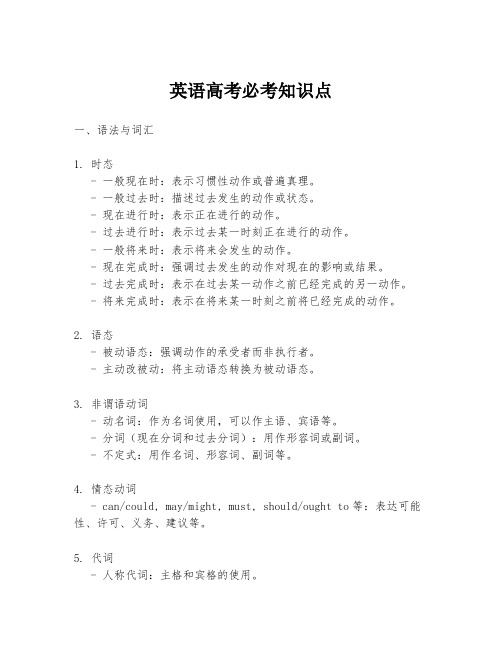
英语高考必考知识点一、语法与词汇1. 时态- 一般现在时:表示习惯性动作或普遍真理。
- 一般过去时:描述过去发生的动作或状态。
- 现在进行时:表示正在进行的动作。
- 过去进行时:表示过去某一时刻正在进行的动作。
- 一般将来时:表示将来会发生的动作。
- 现在完成时:强调过去发生的动作对现在的影响或结果。
- 过去完成时:表示在过去某一动作之前已经完成的另一动作。
- 将来完成时:表示在将来某一时刻之前将已经完成的动作。
2. 语态- 被动语态:强调动作的承受者而非执行者。
- 主动改被动:将主动语态转换为被动语态。
3. 非谓语动词- 动名词:作为名词使用,可以作主语、宾语等。
- 分词(现在分词和过去分词):用作形容词或副词。
- 不定式:用作名词、形容词、副词等。
4. 情态动词- can/could, may/might, must, should/ought to等:表达可能性、许可、义务、建议等。
5. 代词- 人称代词:主格和宾格的使用。
- 物主代词:形容词性物主代词和名词性物主代词。
- 反身代词、指示代词、疑问代词等。
6. 冠词- 不定冠词(a/an)和定冠词(the)的使用。
7. 介词- 常用介词的用法,如at, in, on, for, with, by, etc.8. 连词- 并列连词:and, but, or, so等。
- 从属连词:because, since, although, if, when, etc.9. 句子结构- 简单句、复合句和复杂句的构成。
- 陈述句、疑问句、祈使句和感叹句。
10. 词汇- 常用词汇的记忆和理解。
- 同义词、反义词、短语动词等。
二、阅读理解1. 快速阅读- 快速获取文章大意和主旨。
- 通过标题、首段、尾段和段落首句快速把握文章结构。
2. 细节理解- 理解文章中的具体信息和细节。
- 通过上下文推断生词或难句的含义。
3. 推理判断- 根据文章内容进行逻辑推理。
高考英语语法总结大全
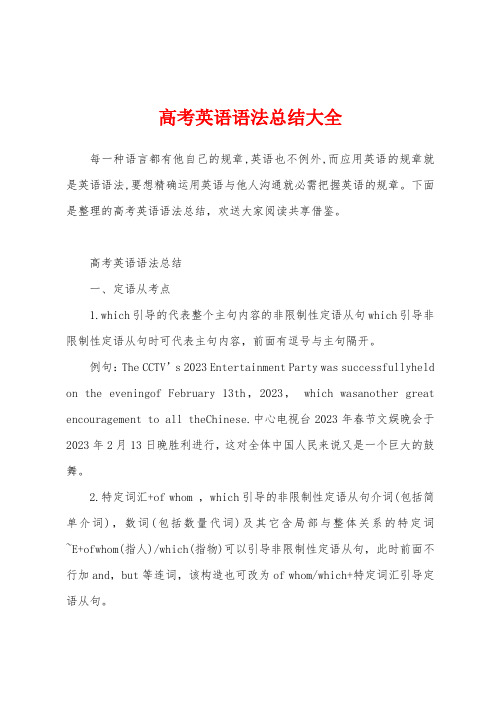
高考英语语法总结大全每一种语言都有他自己的规章,英语也不例外,而应用英语的规章就是英语语法,要想精确运用英语与他人沟通就必需把握英语的规章。
下面是整理的高考英语语法总结,欢送大家阅读共享借鉴。
高考英语语法总结一、定语从考点1.which引导的代表整个主句内容的非限制性定语从句which引导非限制性定语从句时可代表主句内容,前面有逗号与主句隔开。
例句:The CCTV’s 2023 Entertainment Party was successfullyheld on the eveningof February 13th,2023, which wasanother great encouragement to all theChinese.中心电视台2023年春节文娱晚会于2023年2月13日晚胜利进行,这对全体中国人民来说又是一个巨大的鼓舞。
2.特定词汇+of whom ,which引导的非限制性定语从句介词(包括简单介词),数词(包括数量代词)及其它含局部与整体关系的特定词~E+ofwhom(指人)/which(指物)可以引导非限制性定语从句,此时前面不行加and,but等连词,该构造也可改为of whom/which+特定词汇引导定语从句。
例句:Our English teacher has three daughters,all of whom /ofwhom all areconsiderate.我们的英语教师有三个女儿,个个都很善解人意。
3.由when.where引导的先行词隐藏度比拟高的定语从句历年的高考考察实践说明,增加定语从句难度的手段之一是增加先行词的隐藏度,如用point,case,situation等抽象的地点名词做先行词,当其在定语从句中做地点状语时用where引导定语从句的推断难度会增加,用occasion,period等表示抽象时间的名词做先行词,当其在定语从句中做时间状语时用when引导定语从句的判别难度也会增加。
高中英语13个语法考点归纳
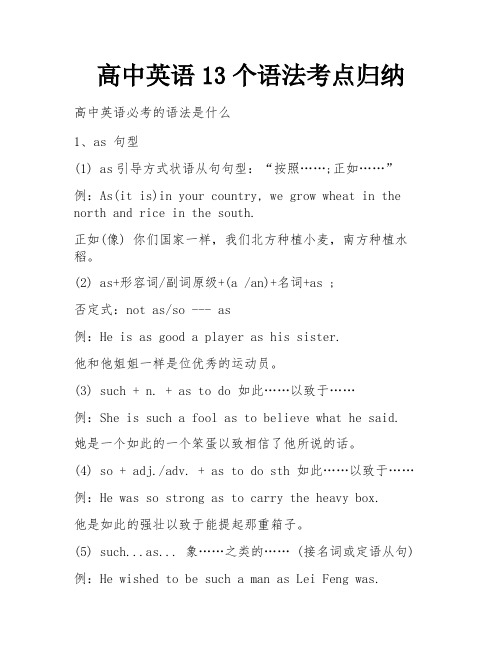
高中英语13个语法考点归纳高中英语必考的语法是什么1、as 句型(1) as引导方式状语从句句型:“按照……;正如……”例:As(it is)in your country, we grow wheat in the north and rice in the south.正如(像) 你们国家一样,我们北方种植小麦,南方种植水稻。
(2) as+形容词/副词原级+(a /an)+名词+as ;否定式:not as/so --- as例:He is as good a player as his sister.他和他姐姐一样是位优秀的运动员。
(3) such + n. + as to do 如此……以致于……例:She is such a fool as to believe what he said.她是一个如此的一个笨蛋以致相信了他所说的话。
(4) so + adj./adv. + as to do sth 如此……以致于……例:He was so strong as to carry the heavy box.他是如此的强壮以致于能提起那重箱子。
(5) such...as... 象……之类的…… (接名词或定语从句)例:He wished to be such a man as Lei Feng was.他希望成为一个像雷锋这样的人。
(6) the same +名词+as 和……一样的…… (接名词或定语从句)例:He is not the same man as he used to be.他不是从前的那样子了。
(7) as 引导非限制性定语从句例:As is known to us, knowledge is power.众所周知,知识就是力量。
(8)引导时间状语从句,与while意义相近例:We get wiser as we get older.随着我们长大,我们也变得越来越聪明。
(9) 引导原因状语从句,与 because的用法相近例:As it was getting very late, we soon turned back.因为越来越迟了,所以我们不久就回来了。
(完整版)高考英语语法知识点总结
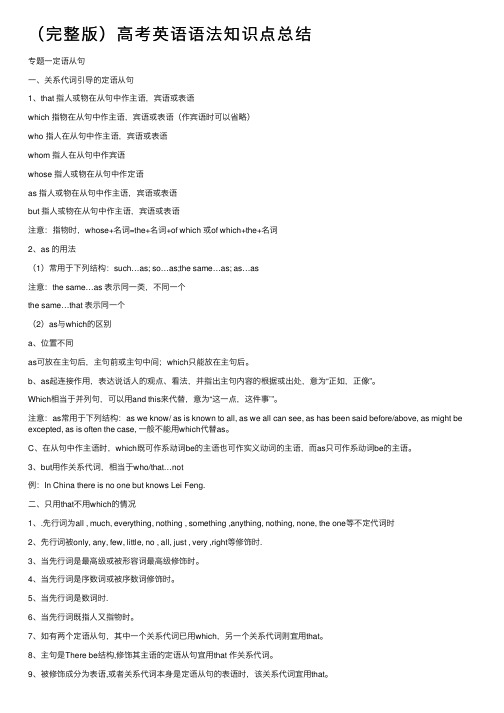
(完整版)⾼考英语语法知识点总结专题⼀定语从句⼀、关系代词引导的定语从句1、that 指⼈或物在从句中作主语,宾语或表语which 指物在从句中作主语,宾语或表语(作宾语时可以省略)who 指⼈在从句中作主语,宾语或表语whom 指⼈在从句中作宾语whose 指⼈或物在从句中作定语as 指⼈或物在从句中作主语,宾语或表语but 指⼈或物在从句中作主语,宾语或表语注意:指物时,whose+名词=the+名词+of which 或of which+the+名词2、as 的⽤法(1)常⽤于下列结构:such…as; so…as;the same…as; as…as注意:the same…as 表⽰同⼀类,不同⼀个the same…that 表⽰同⼀个(2)as与which的区别a、位置不同as可放在主句后,主句前或主句中间;which只能放在主句后。
b、as起连接作⽤,表达说话⼈的观点、看法,并指出主句内容的根据或出处,意为“正如,正像”。
Which相当于并列句,可以⽤and this来代替,意为“这⼀点,这件事’”。
注意:as常⽤于下列结构:as we know/ as is known to all, as we all can see, as has been said before/above, as might be excepted, as is often the case, ⼀般不能⽤which代替as。
C、在从句中作主语时,which既可作系动词be的主语也可作实义动词的主语,⽽as只可作系动词be的主语。
3、but⽤作关系代词,相当于who/that…not例:In China there is no one but knows Lei Feng.⼆、只⽤that不⽤which的情况1、.先⾏词为all , much, everything, nothing , something ,anything, nothing, none, the one等不定代词时2、先⾏词被only, any, few, little, no , all, just , very ,right等修饰时.3、当先⾏词是最⾼级或被形容词最⾼级修饰时。
高考英语必考语法知识点归纳总结
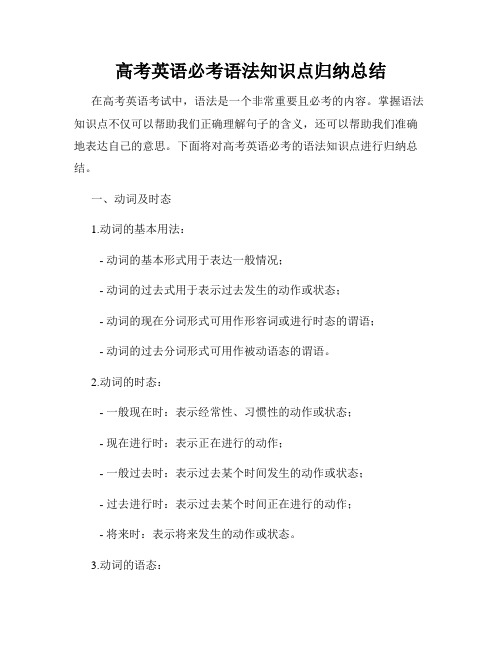
高考英语必考语法知识点归纳总结在高考英语考试中,语法是一个非常重要且必考的内容。
掌握语法知识点不仅可以帮助我们正确理解句子的含义,还可以帮助我们准确地表达自己的意思。
下面将对高考英语必考的语法知识点进行归纳总结。
一、动词及时态1.动词的基本用法:- 动词的基本形式用于表达一般情况;- 动词的过去式用于表示过去发生的动作或状态;- 动词的现在分词形式可用作形容词或进行时态的谓语;- 动词的过去分词形式可用作被动语态的谓语。
2.动词的时态:- 一般现在时:表示经常性、习惯性的动作或状态;- 现在进行时:表示正在进行的动作;- 一般过去时:表示过去某个时间发生的动作或状态;- 过去进行时:表示过去某个时间正在进行的动作;- 将来时:表示将来发生的动作或状态。
3.动词的语态:- 主动语态:表示主语进行或完成动作;- 被动语态:表示主语接受动作。
二、代词1.人称代词:- 主格代词用作主语;- 宾格代词用作宾语或介词的宾语;- 形容词性物主代词用于修饰名词;- 名词性物主代词在句中充当名词的作用;- 反身代词表示动作的主体同时也是动作的承受者。
2.指示代词:- 指示代词可用于指示距离的远近或在句中代替特定的事物。
3.不定代词:- 不定代词用于代替不确定或泛指的人或事物。
三、形容词和副词1.形容词:- 形容词修饰名词,用于描述或限定名词。
2.副词:- 副词修饰动词、形容词或其他副词,用于描述或限定动作的方式、程度等。
四、句型和从句1.简单句:- 简单句由主语和谓语构成,能够独立表达一个完整的意思。
2.并列句:- 并列句由两个或多个独立的分句组成,各分句之间用连词连接。
3.复合句:- 复合句包括一个主句和一个或多个从句。
4.定语从句:- 定语从句用来修饰一个名词或代词,并且不能独立成句。
5.名词性从句:- 名词性从句可以在句子中充当主语、宾语或表语。
五、形式和语气1.直接引语和间接引语:- 直接引语是原话的直接陈述或引述;- 间接引语是对原话的复述或改写。
高三高考英语语法

高三高考英语语法学习外语并不难,学习外语就像交伴侣一样,伴侣是越交越熟的,每天见面,伴侣之间就亲热无间了。
重复重复再重复,娴熟娴熟再娴熟,是学会英语的不二法门。
下面是我给大家整理的一些高三高考的英语语法,盼望对大家有所关心。
高三高考英语语法学问点虚拟语气在一些特别词中的使用或含蓄条件句1.wish后的宾语从句。
与现在愿望不全都,用主语十过去时,例如:I wi。
hIwere you.与过去愿望不全都,用主语+had+过去分词,例如:Iwish I had visited the White House whenI was in the States与将来愿望不全都,用主语+would (could)+原形。
2.Its time句型:当lts tine后用that从句时应当为主i吾+should+动词原形或主语十过去时,例如:It,s time thatyou went to school.或Its time that you should go to schooL3- If only引起的感叹句相当于“How I wish+宾语从句”。
(l)If only he could come.他要能来就好了。
(2)If only I had known the answer.我要早知道答案就好了。
4.WOuld rather,as if(though)引导的从句也需使用虚拟语气,表示过去的状况用过去完成时,表示现在与将来的状况用过去时,例如:(l)Id rather you posted the letter right away.(2)She loves the children as if they were hers.5.含蓄虚拟条件句含蓄条件句是指句中没有明显的虚拟条件句,而是利用其他手段来示意存在虚拟条件。
但是这类隐含式虚拟条件句往往都可以转化为if引导的条件句。
常用来表示含蓄虚拟条件的手段有:(1)介词或介词短语。
高考英语语法知识梳理-----不定代词的用法
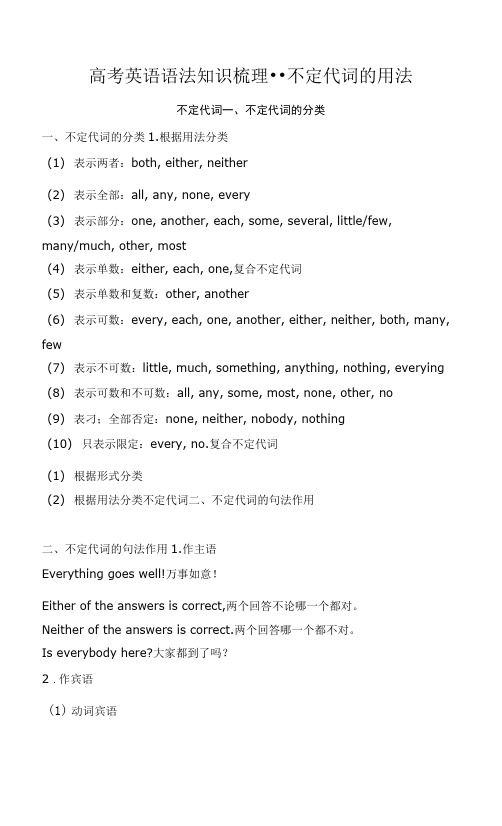
高考英语语法知识梳理••不定代词的用法不定代词一、不定代词的分类一、不定代词的分类1.根据用法分类(1)表示两者:both, either, neither(2)表示全部:all, any, none, every(3)表示部分:one, another, each, some, several, little/few,many/much, other, most(4)表示单数:either, each, one,复合不定代词(5)表示单数和复数:other, another(6)表示可数:every, each, one, another, either, neither, both, many, few(7)表示不可数:little, much, something, anything, nothing, everying(8)表示可数和不可数:all, any, some, most, none, other, no(9)表刁;全部否定:none, neither, nobody, nothing(10)只表示限定:every, no.复合不定代词(1)根据形式分类(2)根据用法分类不定代词二、不定代词的句法作用二、不定代词的句法作用1.作主语Everything goes well!万事如意!Either of the answers is correct,两个回答不论哪一个都对。
Neither of the answers is correct.两个回答哪一个都不对。
Is everybody here?大家都到了吗?2 .作宾语(1)动词宾语I like none of the books.这些书我全不喜欢。
If you have any, give us some.有的话,给我们一点。
We admire all of you.我们钦佩你们大家。
(2)介词宾语There is room for all of us.我们所有的人全坐得下。
高考英语13个语法考点 高中英语重点语法知识归纳

高考英语13个语法考点高中英语重点语法知识归纳高考英语13个语法考点高中英语重点语法知识归纳很多高中生不知道英语语法方面有哪些重点知识,高考英语经常出现的语法考点有哪些呢?下面为大家介绍一下!高考容易出现的13个语法知识总结1. 考查never置于句首时的倒装当否定副词never置于句首时,其后习惯上要用倒装语序(与一般疑问句形式相同)。
如:(答案分别为BA)(1) Never in my wildest dreams _________ these people are living in such poor conditions. (安徽卷)A. I could imagineB. could I imagineC. I couldn’t imagineD. couldn’t I imagine(2) Never before _________ in greater need of modern public transport than it is today. (上海卷)A. has this city beenB. this city has beenC. was this cityD. this city was2. 考查little置于句首时的倒装当否定副词little置于句首时,其后习惯上要用倒装语序(与一般疑问句形式相同)。
如:(答案分别为DD)(1) Little _________ that we were watching his every move, so he seemed to be going his own way in this business. (安徽卷)A. he realizedB. he didn’t realizeC. didn’t he realizeD. did he realize(2) They have a good knowledge of English but little _________ they know about German (天津卷)A. haveB. didC. hadD. do3. 考查seldom置于句首时的倒装当否定副词seldom置于句首时,其后习惯上要用倒装语序(与一般疑问句形式相同)。
高考英语常用语法图解

高考英语常用语法图解一、名词I. 名词的种类:II. 名词的数:1. 规则名词的复数形式:名词的复数形式,一般在单数形式后面加-s或-es。
现将构成方法与读音规则列表如下:2. 不规则名词复数:英语里有些名词的复数形式是不规则的,现归纳如下:III. 名词的所有格:名词在句中表示所有关系的语法形式叫做名词所有格。
所有格分两种:一是名词词尾加’s构成,二是由介词of加名词构成。
前者多表示有生命的东西,后者多表示无生命的东西。
1. ’s所有格的构成:2. ’s所有格的用法:3. of所有格的用法:用于无生命的东西:the legs of the chair, the cover of the book用于有生命的东西,尤其是有较长定语时:the classrooms of the first-year students用于名词化的词:the struggle of the oppressed二、冠词:冠词分为不定冠词(a, an),定冠词(the),和零冠词。
I. 不定冠词的用法:II. 定冠词的用法:III. 零冠词的用法:三、代词:1. one, some与any:1) one可以泛指任何人,也可特指,复数为ones。
some多用于肯定句,any多用于疑问句和否定句。
One should learn to think of others. / Have you any bookmarks? N o, I don’t have any bookmarks.I have some questions to ask.2) some可用于疑问句中,表示盼望得到肯定的答复,或者表示建议,请求等。
W ould you like some bananas? Could you give me some money?3) some 和any修饰可数名词单数时,some表示某个,any表示任何一个。
I have read this article in some magazine. Please correct the mistakes, if any.4) some和数词连用表示“大约”,any可与比较级连用表示程度。
- 1、下载文档前请自行甄别文档内容的完整性,平台不提供额外的编辑、内容补充、找答案等附加服务。
- 2、"仅部分预览"的文档,不可在线预览部分如存在完整性等问题,可反馈申请退款(可完整预览的文档不适用该条件!)。
- 3、如文档侵犯您的权益,请联系客服反馈,我们会尽快为您处理(人工客服工作时间:9:00-18:30)。
高中英语习惯用法汇总【要点点拨】1.It’s the first time that……….(从句中用现在完成时)It was for the first time that………(强调句,对状语for the first time进行强调)It’s (high) time that……..(从句中用过去时或should do)2.It’s the same with sb. / So it is with sb.表示某人也如此(用于前句中既有肯定又有否定或两个不同类的谓语动词)3.…be about to do / be doing……when…….正要做/正在做……就在那时…….4 A is twice / three times as +原级+as BA is twice / three times the n. of B.A is twice / three times +比较级+than B5. It’s a waste of time / money doing / to do…It’s no use / good doing………It’s possible / probable / (un) likely that……….It makes great / no sense to do……做某事很有/没意义6. There’s no use / good doing…….There’s no sense / point (in) doing……There is no need for sth. / to do…….There is (no) possibility that…………(同位语从句)7.The+比较级…….., the+比较级………越…….., 越…….注意:前半句为从句,用一般现在时代替将来时;8. It seems / appears ( to sb. ) that sb…….在某人看来某人……….= Sb. seems / appears to be / to do / to be doing / to have done……..It seems / looks as if……….好象/似乎……..9.It (so) happened that sb. ……..某人碰巧……..= Sb. happened to be / to do / to be doing / to have done…..10.It is said / thought / believed / hoped / supposed …….that sb………=Sb. is said to be / to do / to be doing / to have done……….(注意:这种句型里如带动词hope则不能变成简单句,因为无hope sb. to do结构)12 …….such…….that…….如此…….以致于(引导结果状语从句)…….such……..as……像……..的这种……(as为关系代词,引导定语从句,在从句里充当主、宾、表)13. Do you mind if I do sth.? / Would you mind if I did sth.?14. The chance is that……../ (The )Chances are that……….很可能…….15.Check / Make sure / See to it / See that……..(从句中常用一般现在时) 确信/务必……..16. depend on it that……..取决于see to it that…….负责/设法做到…….注意:除了except / but / in等介词可以直接接that从句,其它介词后必须用it做形式宾语;17.It is / was +介词短语/ 从句/ 名词/代词等+that………How / When / Where / Why is / was it that………..?注意:此句型为强调句,当被强调的为表示人的词时,还可用who连接;强调主语时,从句后的谓语动词应与前面的主语保持一致;注意与定语从句的区别)18 .How is it that……..(这几个句型都表示“怎么会…….?” “怎么发生的?”)How come+从句?How does / did sth. come about? ( How did it come about that…….?)如:How come you are late again?19. There seems / appears / happens to be / must be / can’t be / is (are, was, were)said to be / is (are, was, were) thought to be…….表示“.似乎有/碰巧有/一定有/不可能有/ 据说有/认为有……..”介词(如of )there beingwant / wish / expect there to be要/希望/期待有……..adj. / adv. enough for there to be…….足够…….会有…….注意:there being / there to be为there be的非谓语形式;It is said / thought that there is / are……=There is / was / are / were said (thought) to be……. 如:I have never dream of there being such a good chance for me.It won’t be cold enough for there to be a frost tonight.20. 疑问词+插入语+陈述语序?Who do you think he’ll have attend the meeting?21. But for + n. / pron., sb. / sth. would (not) have done…..要不是……., 某人早就……(表示虚拟语气)=If it had not been for…..,……./ If there had not been ……., ……..22. It won(’t) be long before +从句(从句中用一般现在时)不久/很久就要…….It was (not) long before+从句(从句中用一般过去时)不久/很久才……..23. Those who………….(从句及主句中谓语动词用复数形式).Anyone who…………= Whoever………..(从句及主句中谓语动词用单数形式) 24…….主句(一般现在时或过去时)…...when从句….(might / shou ld do 或might / should have done) 表示”对比”,意思为“本该……(可)而却”,主句中为陈述语气,从句里为虚拟语气,如:Why are you here when you should be in school?你本该上学的怎么在这儿?He stopped trying when he might have succeeded .本该已成功了他却停止努力了.25. There is ./ Sb. have no doubt that………(同位语从句,that不可省略)There is / Sb. have some doubt whether……..(同位语从句不可用if)Sb. doubt if / whether…….Sb. don’t doubt that………26 . immediately / directly / instantly / the moment +从句on / upon + n. / doingNo sooner had sb. done than …….(过去时)Hardly had sb. do ne when……..(过去时)注意:这几个结构都表示“一…….就”;27. every time / each time / the last time / the first time / next time +从句(名词性短语引导一个时间状语句)anywhere / everywhere +从句(相当于wherever引导的地点状语从句)You can go anywhere you like.Next time you come, please bring your son along.28.If only / I wish +从句(用过去类时态) 表示虚拟语气, “要是…….就好了” “但愿……就好了!”29 .Considering + n. 或pron. 或that从句/ Seeing that……….考虑到/鉴于…….Given + n. / pron作状语,表示“在有……的情况下” “如果有” “假定”,有时也表示”考虑到”Seeing (that) he refused to help us, there is no reason why we should help him now. Given good health, I hope to finish the work this year.Given their inexperience / that they are inexperienced, they’ve done a good job.30.There was a time when…….曾经有那么一度……….31.other than与no, not, none等否定词连用,表示肯定意思,如:It was none other than Mr. Smith.这正是Smith先生.32. Not until…….did / do/ does / will sb. do……It was / is not until ……that sb………33.It’s (un) like sb. to do / to have done……做某事很像某人/ 做某事可不像某人34.It remains to be seen Wh--words ……..是否…….还有待于看.(不用that, if作连接词)35.It onl y remains for sb. to do……剩下的只是要某人做某事.We’ve got everything ready. It only remains for you to come to dinner.36.One moment……., and now………刚才一会儿还在做……而现在却……..37.Not all / both / everyone………表示部分否定38. Such is / are……..这(些)就是…….(谓语动词单复数由后面名词决定)39. I’d rather (not) do / have done……我宁愿…..I’d rather +从句(从句中用过去时或过去完成时)40. It’s important / necessary / strange / surprising….+that……(用陈述语气或should do)41. I like / hate / appreciate it that / when等从句(it表示后面从句的这种情况)I appreciate it if you will give me a hand.42. By the time +从句(一般现在时/过去时),主句(将来完成时/过去完成时)43………., as is often the case with sb. / as is usual with sb.(as引导非限制性定语从句)44 in case / lest / for fear that…….(从句中用陈述语气或should do)45.While置于句首可表示As long as 或AlthoughWhile there is life there is hope.While I admit his good points, I can see his bad ones.46. can not ( never) ……too +adj. (adv. ) / adj. (adv.) + enough “越……越好”“非常”too + adj. ( anxious / eager / willing / ready / glad等)+to do….表示肯定意思I can’t thank you enough.我非常感激你.He was too glad to see his father.=He was very glad to see his father.47. not / neve等表示否定的词与比较级连用表示最高级,如:-----Do you agree with his suggestion? -------I can’t agree more.48. What if……..要是…….怎么办?What if he doesn’t come tomorrow?49. more……..than与其…….不如……..He is more nervous than frightened.50. It is / has been +一段时间+since从句(从句中如为延续性动词,则实际表示的意思相反)It is two years since he drank.他不喝酒已两年了.【各个击破】1.Mr. Smith didn’t understand ______ made his son so upset this morning.A. what was itB. why it was thisC. how that wasD. what it was that2.-----Did you have a good sleep last night?----Yes, never sleep _______.A. badlyB. betterC. worseD. best3.We are only _____ glad to do anything we can _______ her.A.too; to helpB. very; help C too; help D. very; helping4.-----How come you are late for class again?-------_____________.A. Because I missed the busB. By bus and then on footC. Please excuse meD. It’s quite wrong5._______more than 3,000 languages in the world.A. There are thought to beB. There is thought to beC. They are thought to beD. It is thought to be6.-----George is a wise person.-----But in my opinion, he is ______ than wise.A. clevererB. braverC. more braveD. less brave7.-----So can I ask you a few fairly straightforward questions about yourself?-----No problem. I like ________ when people are open and direct.A. thatB. thisC. itD. them8.----______I move the picture over here?----I suppose it’ll look better.A. How ifB. What aboutC. How aboutD. What if9.China has produced ______ this year as it did in 2002.A. as twice much steelB. twice steel as muchC. twice as much steelD. as much steel twice10.-----_______was it ______ you discovered the secret of his?------Totally by chance.A. How; whenB. What; thatC. What; whenD. How; that11.-----Who on earth could it be?------It was _______ other than Clint Eastwood.A. noneB. nothingC. notD. nobody12._____his age, he did it quite well, so don’t ______ him any more.A Given; blame B. Considered; say C. To regard; scold D. Considering; speak13.No sooner _____ themselves in their seats in the theatre ______ the curtain went up.A. they have settled; beforeB. had they settled; thanC. have they settled; whenD. they had settled; than14. -----Did you meet with the famous space hero, Yang Liwei?------______I had come here earlier!A. If onlyB. If notC. But forD. For fear15.The students expected __________ more reviewing classes before the final exams.A. it would beB. there beingC. it to beD. there to be16.Students shouldn’t be given so difficult a problem _____ they can not work out.A. thatB. whichC. whileD. as17. It was twelve o’clock at midnight _______ they arrived at a lonely village.A. thatB. beforeC. sinceD. when18.-----The exam wasn’t difficult, was it?------No, but I don’t think ______could pass it.A. somebodyB. anybodyC. everybodyD. nobody19.-----I always take care when doing papers on the computer.-----You meant it! One can not be _______careful working on it.A. tooB. veryC. soD. quite20.-----Is Miss White working these days?------No. It is two months since she worked here.------Oh,_____________?A. where is she working nowB. would you please show me the wayC. which is her officeD. is she ill。
